As businesses grow, efficient communication becomes more important. Virtual PBX phone systems are a great solution for small businesses, offering cloud-based and scalable platforms that help improve operations.
A recent study shows that more than 60% of small businesses are choosing cloud-based PBX systems because they are affordable and flexible.
In this blog, we will look at the top 7 virtual PBX systems that can help small businesses improve communication. Additionally, we will also discuss the key benefits of these systems and outline the steps to get started.
Pro-tip
If you are a small business owner, I recommend testing the trial versions of these virtual PBX systems before committing. This will give you a hands-on feel for the features and interface, helping you make a better decision. Pay attention to ease of use, call quality, and customer support to ensure it fits your business needs.
Top 7 Virtual PBX Phone Systems for Small Businesses
The below outlined are the 7 best virtual PBX systems for small businesses. Let’s take a closer look at each of their features, benefits, and pricing to help you choose the one that best fits your business needs.
| Company | Rating | Plan | Top Features | Learn More |
|---|---|---|---|---|
|
|
Starter: $18/month Professional: $30 /month Ultimate: $42 /month |
|
Sign Up Now | |
 |
Core: $20 Advance: $25 Ultra: $35 |
|
Learn More | |
 |
Essentials: $18.95 Professional: $22.95 Enterprise:: $32.95 |
|
Learn More | |
 |
Ooma Office Essentials: $19.95 Ooma Office Pro: $24.95 Ooma Office Pro Plus:$29.95 |
|
Learn More | |
 |
|
Learn More |
Disclaimer:
The providers featured in this article were carefully selected after evaluating their features, reliability, and reputation in the market. We assessed each system for its performance, ease of use, and ability to scale with growing business needs. While these options are among the best solutions, it’s important to note that this list is not exhaustive and there may be other suitable providers available. Do your own research to make sure the provider you choose meets your specific requirements and is the right fit for your business communication needs.
1. CallHippo
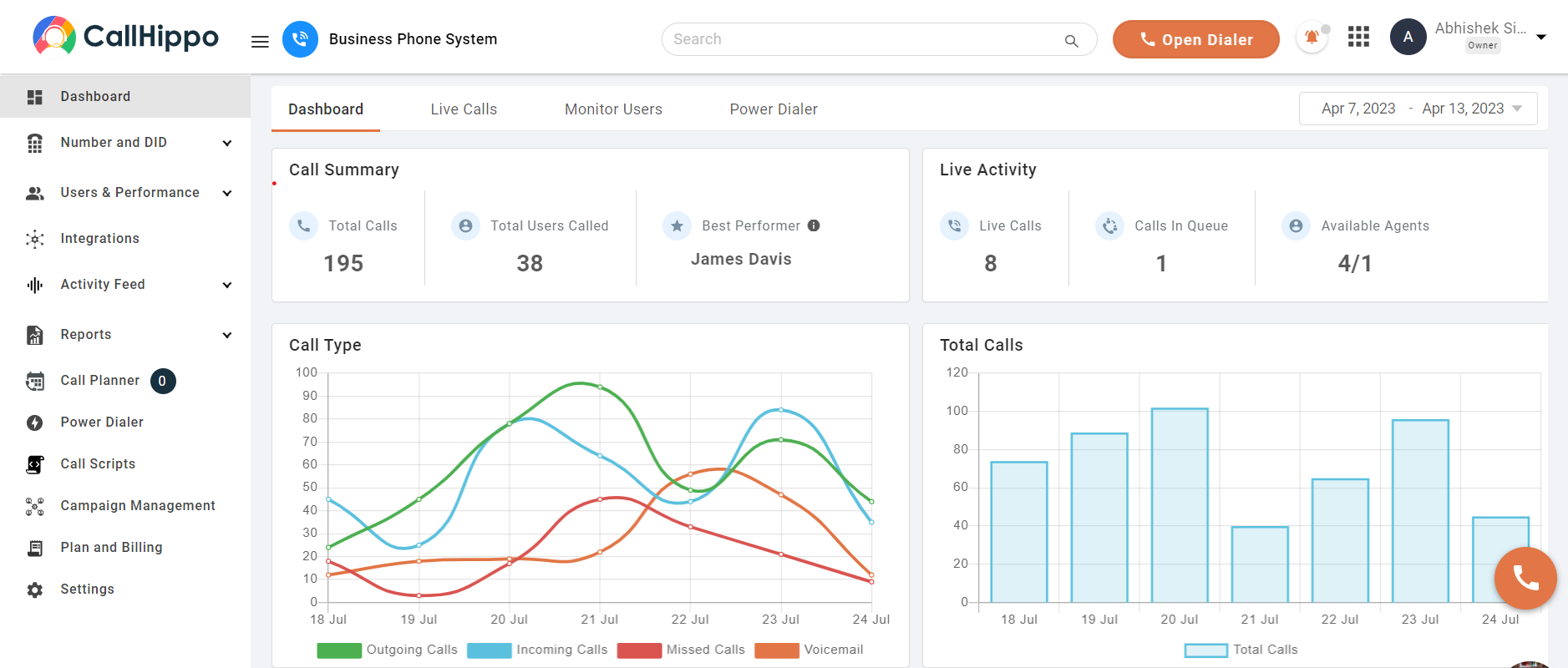
CallHippo is one of the best virtual PBX phone systems designed for small businesses. It provides a cloud-based communication platform that eliminates the need for traditional phone hardware. With its user-friendly interface and quick setup process, CallHippo helps businesses improve their communication efficiency.
Its scalable features and integration options make it ideal for growing businesses. Small teams can manage calls effortlessly with advanced features like analytics, voicemail, and call queuing, making it a reliable virtual PBX system.
Key Features
- Power Dialer
- Call Analytics
- Gen AI LLMs
- Sentiment analysis
- Call performance ratings
- Answering Machine Detection
- Interactive Voice Response (IVR)
Pros
- Quick setup saves time and improves efficiency.
- Cloud-based system eliminates expensive hardware costs.
- Scalable plans adapt to growing business needs.
Cons
- Advanced tools may require some initial learning.
- Dependence on a stable internet for smooth operation.
Pricing: CallHippo offers flexible plans for different business requirements:
- Starter: $18/month
- Professional: $30 /month
- Ultimate: $42 /month
Best For: Small businesses looking for the best virtual PBX system to optimize communication while saving costs and scaling efficiently.
2. RingCentral
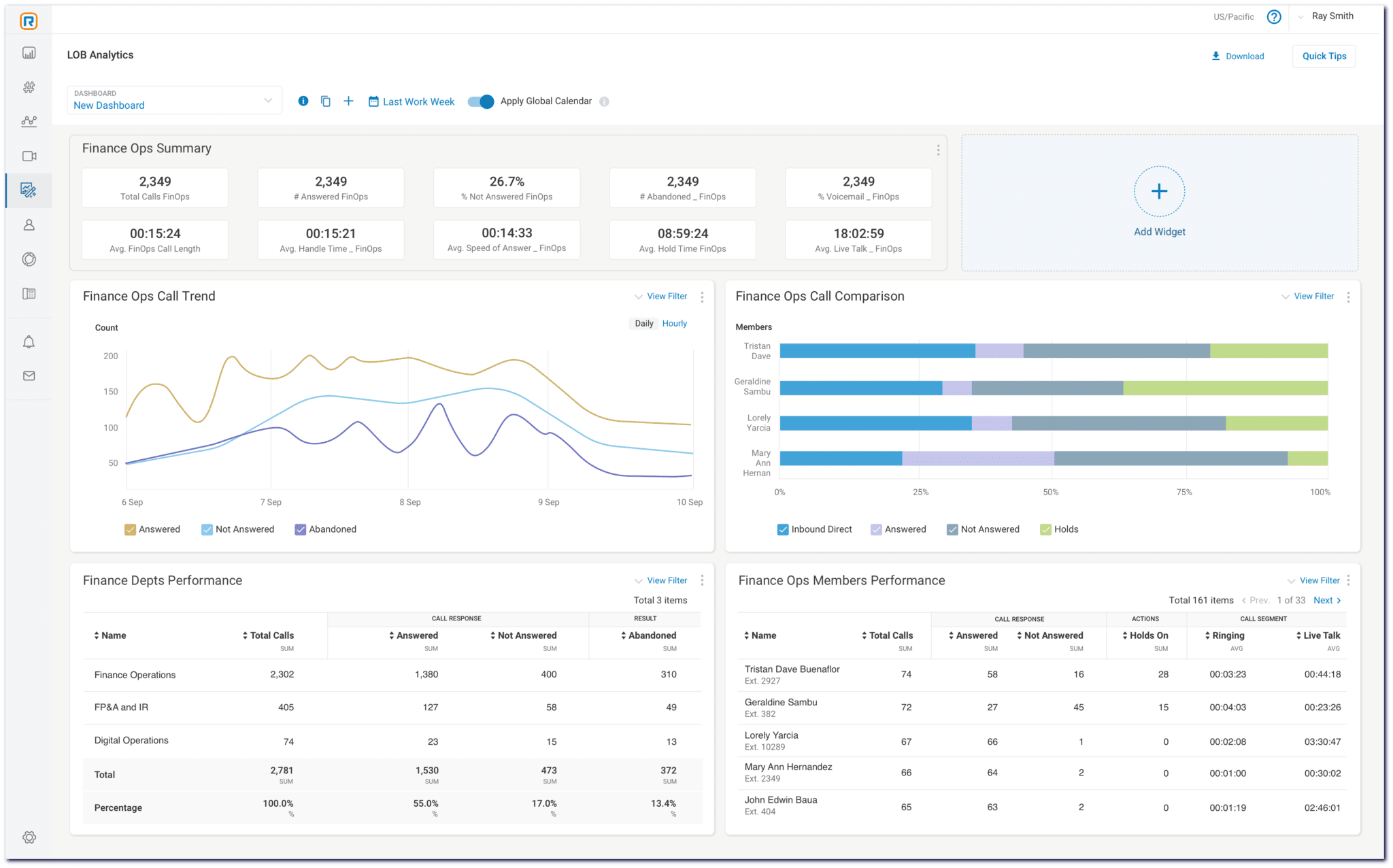
RingCentral is among the best virtual PBX phone systems for small businesses, offering an all-in-one cloud-based communication platform. It integrates voice, video, messaging, and collaboration tools into a single solution, enabling teams to connect seamlessly across various devices and locations.
With its intuitive interface and robust features, RingCentral enhances productivity and ensures reliable communication for businesses of all sizes.
Key Features
- AI-Powered Calls
- Team Messaging
- Video Conferencing
- Auto-Attendant
- Call Management
- Integrations with Popular Apps
- Mobile and Desktop Applications
Pros
- Unified platform simplifies communication across channels.
- AI features enhance productivity and user experience.
- Scalable plans accommodate business growth effectively.
Cons
- Advanced features may require time to master.
- Costs can increase with additional features.
Pricing: RingCentral offers flexible plans to suit various business needs:
- Core: Starts at $20 per user/month
- Advanced: Includes additional administrative and analytics features
- Ultra: Offers the most comprehensive set of features
Volume discounts are available for businesses with over 50 users.
Best For: Small businesses seeking a reliable and scalable virtual PBX system that integrates AI-powered communication tools to enhance collaboration and efficiency.
3. Nextiva
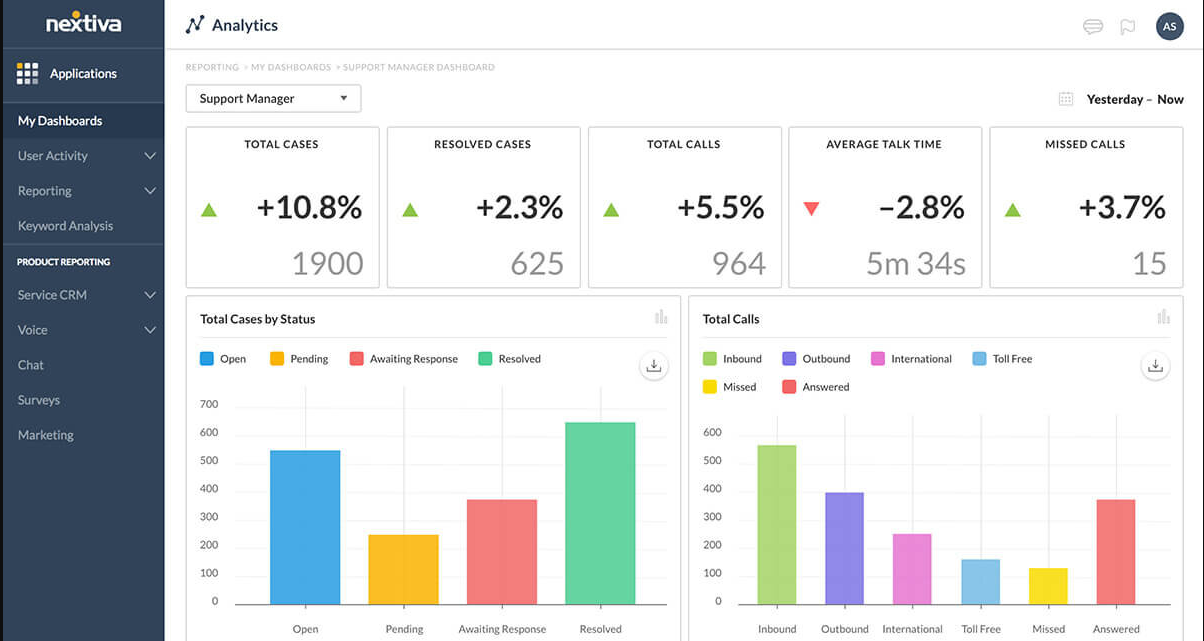
Nextiva is among the best virtual PBX phone systems for small businesses, offering a cloud-based solution that simplifies communication. By eliminating the need for on-premises hardware, Nextiva provides a reliable and scalable platform.
In addition, with features like auto-attendants and call routing, businesses can enhance their communication efficiency. Nextiva’s commitment to security and compliance ensures data protection, making it a trusted choice for small businesses seeking an efficient virtual PBX system.
Key Features
- Auto Attendant
- Call Routing
- Voicemail Transcription
- Video Conferencing
- Call Analytics
- Team Messaging
- Mobile and Desktop Apps
Pros
- Easy setup with no complex hardware required.
- Scalable plans that are suitable for growing businesses.
- Advanced features enhance communication efficiency.
Cons
- Advanced features may require additional training.
- Some integrations may incur extra costs.
Pricing: Nextiva offers flexible pricing plans to accommodate various business needs
- Core: $30 per user/month
- Engage: $40 per user/month
- Power Suite: $60 per user/month
Each plan includes specific features tailored to different requirements.
Best For: Small businesses seeking a reliable and scalable virtual PBX system to enhance communication without the need for traditional hardware.
4. Ooma Office
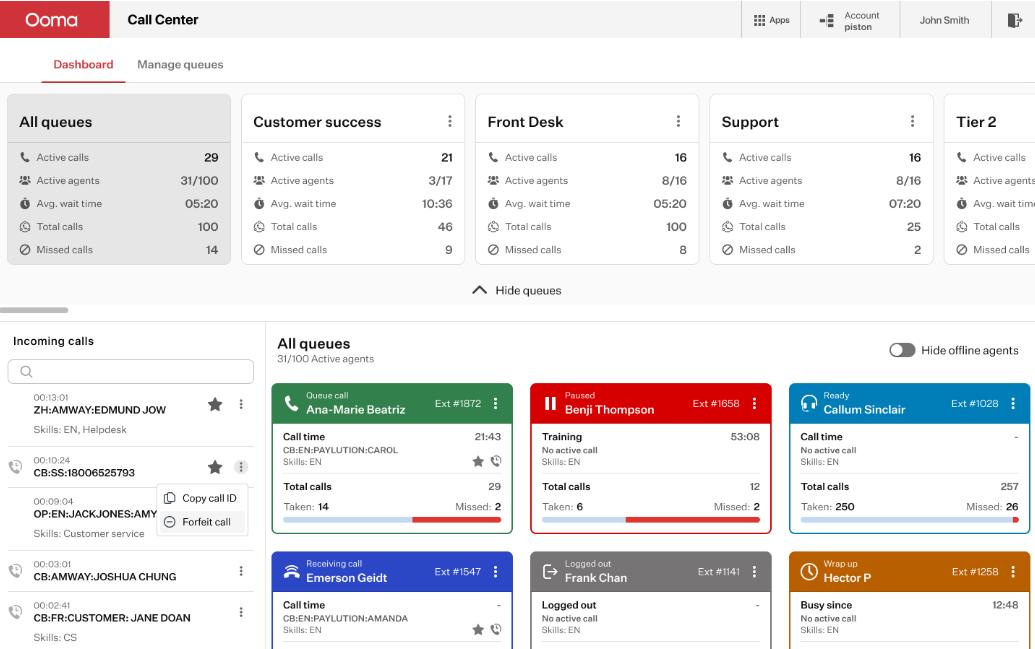
Ooma Office is a cloud-based phone system tailored for small businesses, offering over 50 features to enhance communication. It provides functionalities such as a virtual receptionist, ring groups, and a mobile app, enabling teams to connect seamlessly across devices.
With a straightforward setup and affordable pricing, Ooma Office eliminates the need for traditional phone lines, making it a practical choice for businesses seeking reliable and scalable communication solutions.
Key Features
- Virtual Receptionist
- Ring Groups
- Mobile App
- Virtual Fax
- Call Blocking
- Voicemail Transcription
- Video Conferencing
Pros
- Easy setup suitable for non-technical users.
- Mobile app supports remote work flexibility.
- Competitive pricing with essential features included.
Cons
- Advanced features may require higher-tier plans.
- Limited international calling options.
Pricing: Ooma Office offers tiered plans to accommodate various business needs:
- Essentials: Starts at $19.95 per user/month
- Pro: Includes additional features at a higher rate
- Pro Plus: Offers the most advanced features
Best For: Small businesses seeking an affordable, easy-to-implement virtual PBX system with essential communication features.
5. GoTo Connect
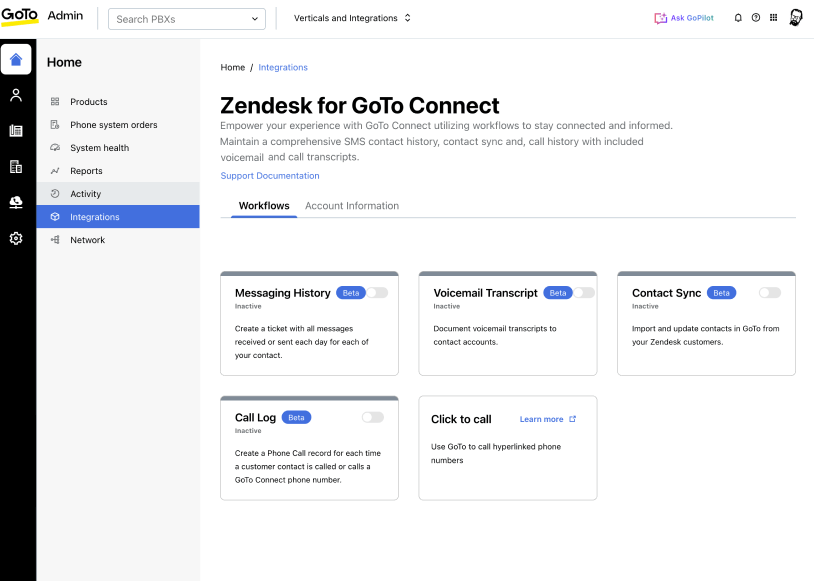
GoTo Connect is a unified communications platform combining VoIP phone systems with video, audio, and web conferencing. It is designed for small businesses and offers features like call routing, auto attendants, and a drag-and-drop dial plan editor, facilitating customized call distribution.
With unlimited international calling to over 50 countries, GoTo Connect is ideal for businesses with global interactions, providing a powerful solution to optimize communications.
Key Features
- Auto Attendants
- Call Routing
- Video Conferencing
- Team Messaging
- Call Analytics
- Customizable Dial Plans
- International Calling
Pros
- Unlimited international calling to 50+ countries.
- Customizable call routing with an intuitive interface.
- Integrates voice, video, and messaging in one platform.
Cons
- Basic plan has limited features.
- SMS credits are capped per user monthly.
Pricing: GoTo Connect provides flexible pricing plans:
- Basic: Limited features suitable for small teams
- Standard: Includes unlimited calling and advanced features
- Premium: Offers advanced tools for larger organizations
Best For: Small businesses requiring a unified communication system with extensive international calling capabilities.
6. 8×8
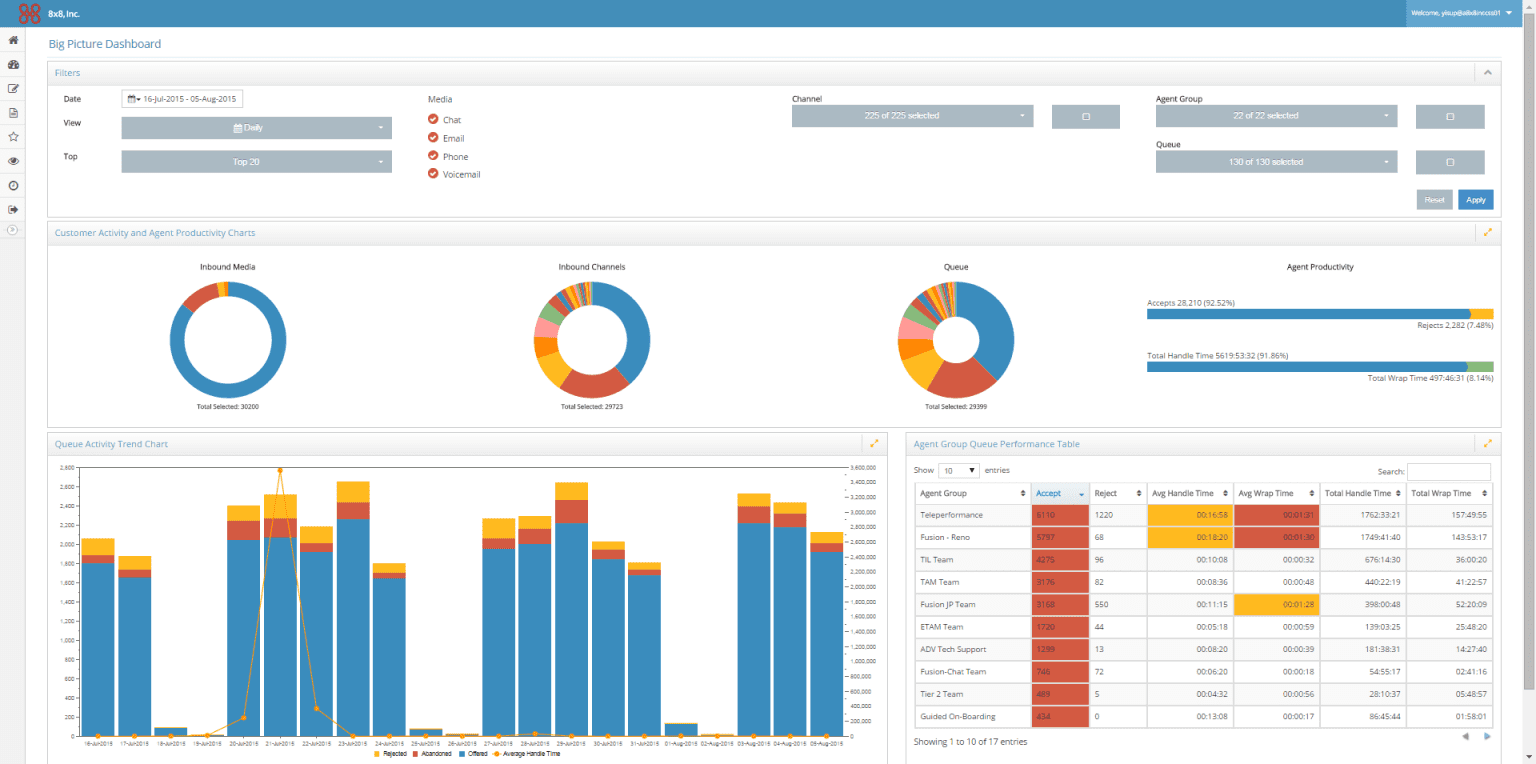
8×8 is a cloud-based communication platform offering VoIP phone services, video conferencing, and team messaging. Aimed at small businesses, it provides features like call management, auto attendants, and integration with popular CRM systems.
8×8 ensures secure and reliable communication with global reach, supporting businesses in maintaining connectivity with clients and teams worldwide. Its scalable solutions cater to growing business needs, making it a versatile choice for various industries.
Key Features
- Auto Attendant
- Call Management
- Video Conferencing
- Team Messaging
- CRM Integration
- Call Recording
- Analytics Dashboard
Pros
- Integrates seamlessly with major CRM platforms.
- Provides global coverage with reliable service.
- Scalable plans suitable for business growth.
Cons
- Initial setup may be complex for some users.
- Advanced features come at higher pricing tiers.
Pricing: 8×8 offers various plans to suit different business sizes:
- Express: Basic features for small teams
- X2: Includes unlimited calling and video conferencing
- X4: Adds advanced analytics and call management
Best For: Small businesses looking for an end-to-end communication solution with CRM integration and global reach.
7. Dialpad
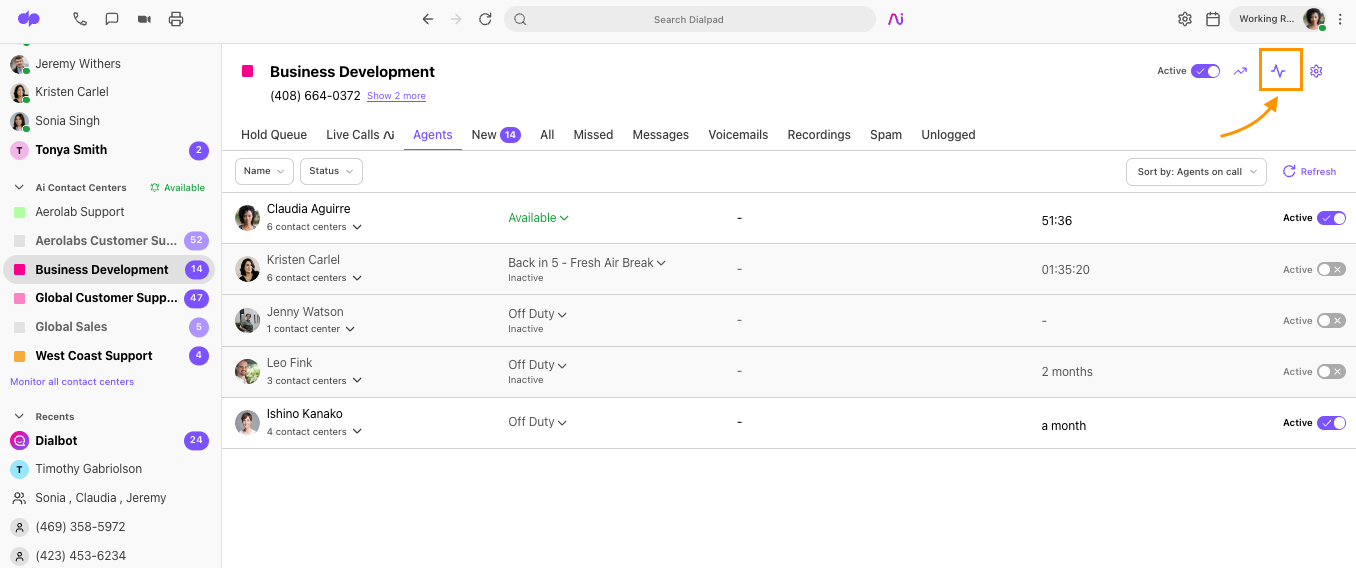
Dialpad is a modern business communication platform providing VoIP phone services, messaging, and video conferencing. Designed for small businesses, it offers features like voice intelligence, call routing, and seamless integrations with tools like Google Workspace and Microsoft 365.
Dialpad’s AI-powered capabilities enhance productivity by providing real-time transcriptions and insights. Its user-friendly interface and flexibility make it suitable for teams working remotely or in-office, ensuring efficient and effective communication channels.
Key Features
- Voice Intelligence
- Real-Time Transcription
- Call Routing
- Video Conferencing
- Messaging
- Integrations with Google Workspace and Microsoft 365
- Analytics
Pros
- AI features enhance call productivity.
- Real-time transcriptions aid in record-keeping.
- Integrates well with popular business tools.
Cons
- AI functionalities may have a learning curve.
- Internet-dependent, requiring stable connectivity.
Pricing: Dialpad offers several pricing tiers:
- Standard: Basic features suitable for small teams
- Pro: Includes advanced analytics and integrations
- Enterprise: Custom solutions for larger organizations
Best For: Small businesses seeking an AI-powered virtual PBX system with real-time insights and seamless integrations for enhanced productivity and communication.
Why Is CallHippo the Best Choice?
CallHippo is one of the best virtual PBX phone systems for small businesses. It’s an affordable, easy-to-use solution that helps businesses stay connected and manage communication effectively. Here’s why CallHippo is a great choice:
- AI-Powered Features: CallHippo comes with advanced AI features that improve how businesses handle calls. The system can automatically route calls, predict call volumes, and provide real-time analytics. Also, the AI voice agent can handle basic tasks and provide 24/7 support to customers.
- Affordable Pricing: CallHippo offers flexible pricing plans that fit various business needs. The free plan works well for startups, while the paid plans, starting at just $16 per user per month, give you more features, such as call forwarding and voicemail, without breaking the bank.
- User-Friendly Interface: CallHippo is known for its simple, easy-to-navigate interface. You don’t need technical skills to set it up or use it, making it ideal for businesses that want a straightforward phone system.
Conclusion:
To wrap up, cloud-based PBX systems offer many valuable benefits that can greatly improve your business’s communication and efficiency. They easily integrate with other business tools, provide strong disaster recovery, and help simplify compliance with regulations. These systems also improve the customer experience with faster call routing. Overall, a cloud PBX system is a smart choice for businesses looking to stay competitive, secure, and sustainable.
FAQs
1. Is PBX better than VoIP?
PBX is a traditional phone system, while VoIP (Voice over Internet Protocol) uses the internet to make calls. VoIP is generally more cost-effective and flexible than PBX.
2. What is the difference between Virtual PBX and PBX?
A Virtual PBX is cloud-based, meaning it doesn’t require physical hardware. In contrast, traditional PBX systems are on-premise and rely on physical infrastructure, making Virtual PBX more scalable and flexible.
3. What type of PBX is commonly used in companies today?
Most companies today use VoIP-based PBX systems, which are internet-based. They offer more flexibility, lower costs, and advanced features compared to traditional landline PBX systems.
4. What is the difference between PBX and EPABX?
PBX handles internal phone systems, while EPABX (Electronic Private Automatic Branch Exchange) automates call routing and management. EPABX is a more advanced, electronic version of PBX.

Let’s Stay in Touch
Subscribe to our newsletter & never miss our latest news and promotions.



